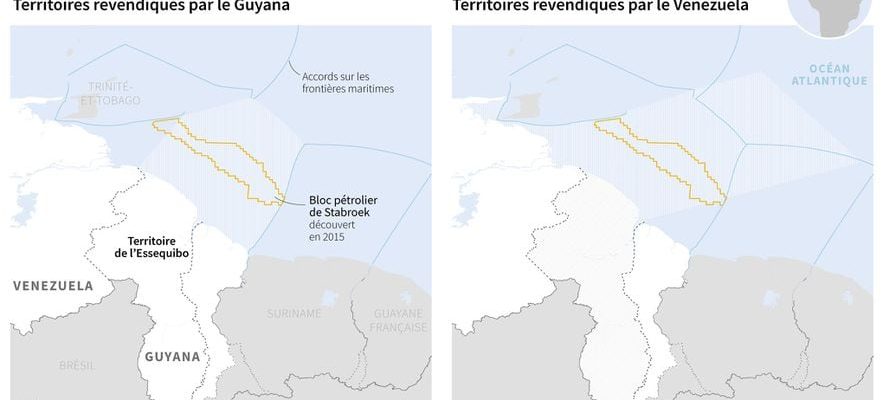The international community is concerned about the growing tension between Venezuela and Guyana on the Essequibo. This oil-rich region finds itself at the heart of a dispute between the two countries which nevertheless assured, Wednesday December 6, that they had opened “communication channels”. L’Express summarizes the latest information on this crisis.
What happened to the helicopter that disappeared?
Adding to this tension, a Guyanese army helicopter with seven people on board which was operating in the border area has disappeared, announced in the evening the Guyanese Chief of Staff, Omar Khan, who, however, added that ” We have no information suggesting Venezuelan intervention. He said the weather was “bad” but confided that “we are considering all possibilities.” The search will resume on Thursday. The general also confided: this “adds anxiety to the period we are going through”.
What are the reactions abroad?
Faced with a situation that threatens to ignite, the UN Security Council will examine this crisis behind closed doors this Friday, following a request from Georgetown.
Since the start of the crisis, Venezuela and Guyana have carried out major military maneuvers in the border area. Commenting on the general situation, Washington said: “It’s concerning, we’re monitoring this very, very closely.” “We obviously don’t want there to be any violence or conflict,” said US National Security Council spokesman John Kirby. While tension is high, the United States will also conduct “routine” military air exercises in Guyana, the American embassy in the country announced this Thursday.
For its part, the UN “firmly supports the use of exclusively peaceful means to resolve international disputes,” reacted Wednesday Stéphane Dujarric, spokesperson for Secretary General Antonio Guterres. However, he recalled that “the decisions of the International Court of Justice (ICJ)” which asked the two countries on Friday to “refrain from any action likely to aggravate the dispute” are “binding”, saying he was “convinced that both States will duly comply with the order of the Court.”
Venezuela does not recognize the ICJ in the case, demanding a negotiated settlement from an agreement signed in 1966 with the United Kingdom just before Guyana’s independence. China asked the two countries to resolve their dispute “properly”, while the Brazilian army announced on Wednesday a strengthening of its presence on its borders with Guyana and Venezuela.
What are Caracas’ demands?
Caracas has for decades claimed Essequibo (sometimes called Guayana Esequiba), a territory of 160,000 km2 representing more than two thirds of Guyana and where 125,000 people live, or a fifth of its population. Caracas has become more pressing since the discovery of significant oil reserves by ExxonMobil in 2015.
Border dispute between Venezuela and Guyana
© / afp.com/Guillermo RIVAS PACHECO, Paz PIZARRO, Jean-Michel CORNU, Patricio ARANA
What is the state of relations between the two countries?
After bitter exchanges, the two countries renewed contact on Wednesday with a telephone call between the Minister of Foreign Affairs (Guyanese) Hugh Todd and Venezuelan Yvan Gil “to discuss the issue of the territorial dispute”, according to a press release from the Venezuelan ministry. The two countries “agreed to keep communication channels open,” the text adds.
This rapprochement contrasts sharply with the press release issued barely five hours earlier by the same Venezuelan Ministry of Foreign Affairs. Caracas accused Guyanese President Irfaan Ali of having “irresponsibly” given the “green light” to the installation of American military bases in Essequibo.
Tension rose a notch on Tuesday with announcements from the presidents of the two countries. Venezuelan President Nicolas Maduro has called for the creation of a special military zone near the border and ordered the state-owned giant PDVSA to grant oil exploitation licenses in Essequibo, under Guyanese administration. President Ali reacted on Tuesday evening. “This is a direct threat to the territorial integrity, sovereignty and political independence of Guyana” he declared, stressing that his army was on “full alert” and accusing Venezuela of being an “outlaw nation” and “a significant risk to peace and security.”
What is Venezuela’s strategy?
For Mariano de Alba of the International Crisis Group (ICG), Nicolas Maduro seeks to put “pressure on the Guyanese government to sit down and negotiate”. “In the short term, the rhetoric of confrontation will continue, but at the same time, I consider that an armed conflict is unlikely,” continues the expert, warning that “any error” in this context could cause a rapid escalation.
Nicolas Maduro relies on the referendum organized in Venezuela on Sunday. According to official figures – disputed by many observers – some 10.4 million Venezuelan voters took part in the vote and 95% said they were in favor of the integration of Essequibo into the country.
Venezuela maintains that the Essequibo River should be the natural border, as in 1777 during the time of the Spanish Empire. Guyana, for its part, believes that the border dates from the English colonial era and was ratified in 1899.
